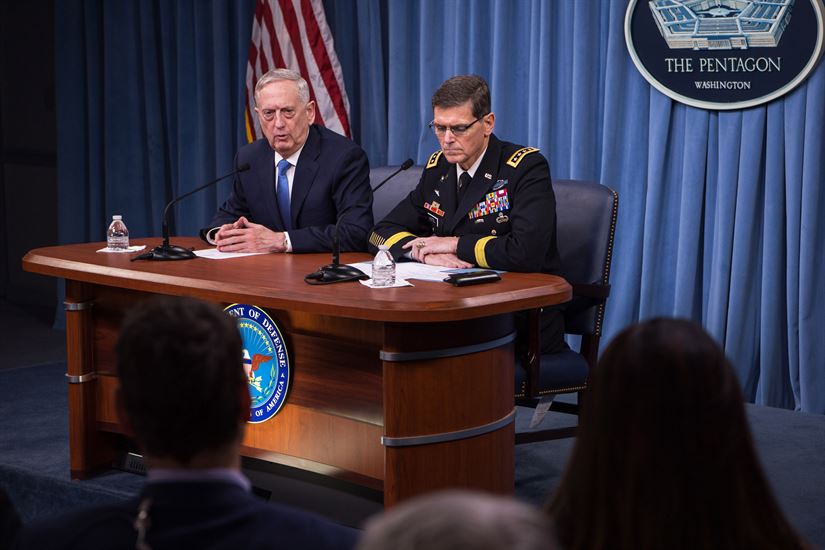Secretary of Defense James Mattis, accompanied by Army General Joseph L. Votel, commander of U.S. Central Command, appeared before the press at the Pentagon on Tuesday to address questions that persist regarding the April 6th missile strike against the Syrian airfield reportedly responsible for a chemical attack carried out against civilians earlier in that week.
Mattis told reporters that he had personally reviewed the intelligence gathered by the American and allied intelligence apparatus in place in Syria and concluded that there was “no doubt” that Assad’s regime was responsible for both the decision to use chemical weapons and for the attack itself.
“In response to the attack, our government began a deliberate process, led by the National Security Council, to recommend diplomatic and military options to the president,” Mattis said. According to the Defense Secretary, the meetings were conducted over two days and included talks with U.S. allies.
“The National Security Council considered the near-century-old international prohibition against the use of chemical weapons, the Syrian regime’s repeated violations of that international law, and the inexplicably ruthless murders the regime had committed,” Mattis said of the decision-making process.
Among the issues of discussion, according to Mattis, were how best to “deter the regime from doing this again,” as well as how to most effectively avoid civilian casualties while still striking at Assad’s operational capabilities. He also added that “appropriate actions” were taken to ensure the safety of Russian personnel located at Syria’s Shayrat airfield, where the missile strike was targeted.
Mattis also spoke to the President’s ultimate decision to carry out the strike, which came after Mattis outlined multiple potential avenues and their predicted outcomes. At that point, Mattis said, the president chose to take military action “consistent with U.S. vital national interests to deter the use of chemical weapons.”
“This military action demonstrates the United States will not passively stand by while [Syrian President Bashar al-Assad] blithely ignores international law and employs chemical weapons he had declared destroyed,” Mattis said.
Important among Mattis’ points was the fact that last week’s missile strike was intended as a strategic deterrent to any further chemical weapon attacks, but did not represent a shift in U.S. policy toward unseating Assad from the helm of the Syrian government.
“Our military policy in Syria has not changed,” the secretary said. “Our priority remains the defeat of ISIS. ISIS represents a clear and present danger, an immediate threat to Europe, and ultimately, a threat to the United States homeland.”
General Votel chimed in at this point in the press conference to convey the role he and his command played in the strike.
“We did that and developed a target-strike package with the goal being to eliminate those capabilities — including airframes, equipment and fuel supplies — that provided offensive military capacity for the regime from Shayrat airfield,” Votel said. “We did not deliberately target personnel in these strikes.”
Already have an account? Sign In
Two ways to continue to read this article.
Subscribe
$1.99
every 4 weeks
- Unlimited access to all articles
- Support independent journalism
- Ad-free reading experience
Subscribe Now
Recurring Monthly. Cancel Anytime.
Votel concluded his statements by relaying CENTCOM’s assessment of the damage inflicted on the airfield.
“We assessed that we achieved our stated objective, and the regime’s ability to generate offensive military capability from Shayrat airfield, which we assess was the launching point for this chemical attack, has been severely degraded,” he said.
“We are obviously paying close attention to the environment in the wake of these strikes, and remain appropriately postured to respond as necessary,” he said.
At that point, Mattis ended the press briefing with an ominous warning directed at Assad.
“The Syrian regime should think long and hard,” he said, “before it again acts so recklessly in violation of international law against the use of chemical weapons.”
Image courtesy of the Department of Defense










COMMENTS